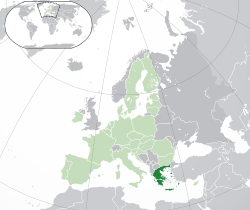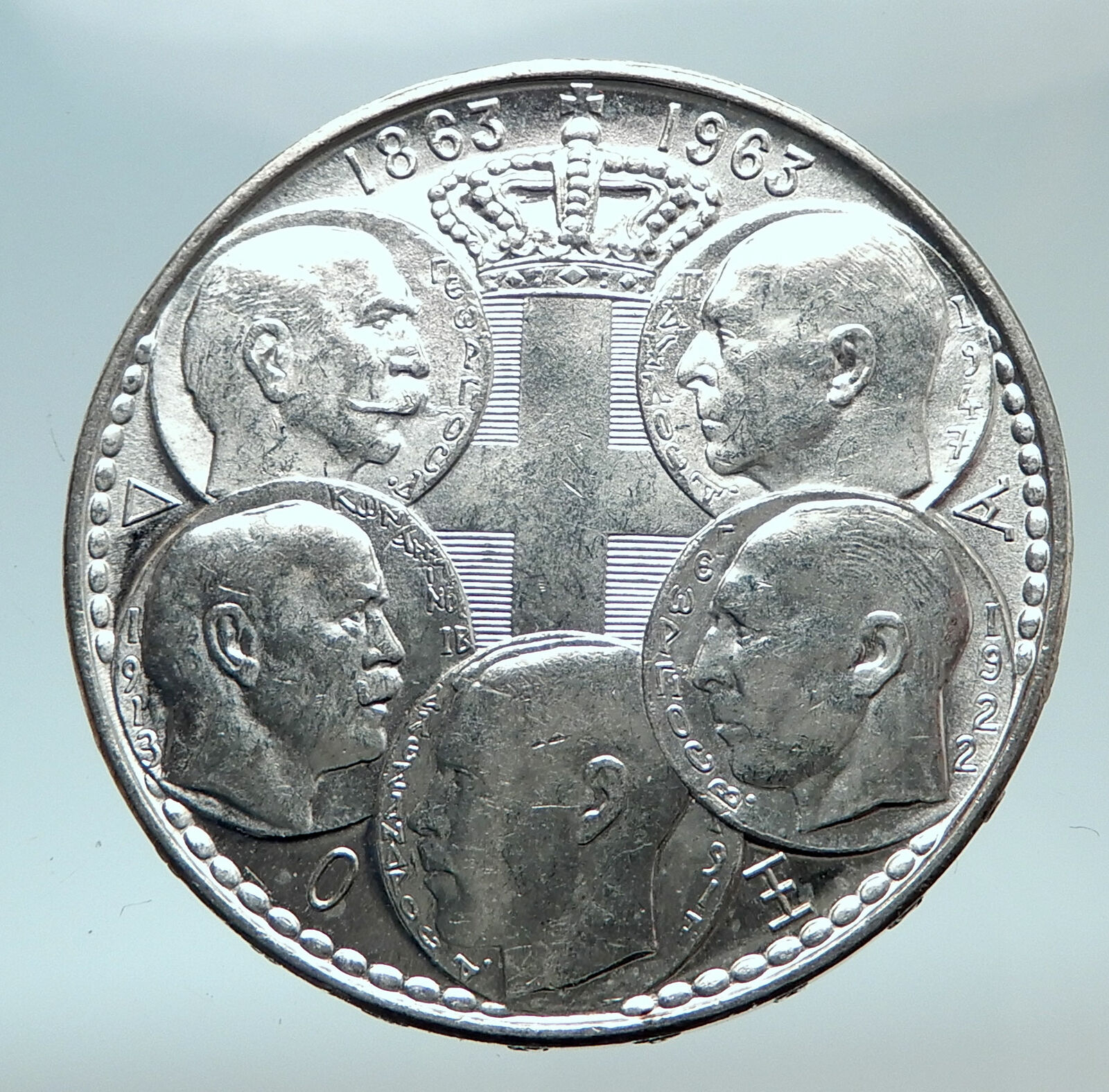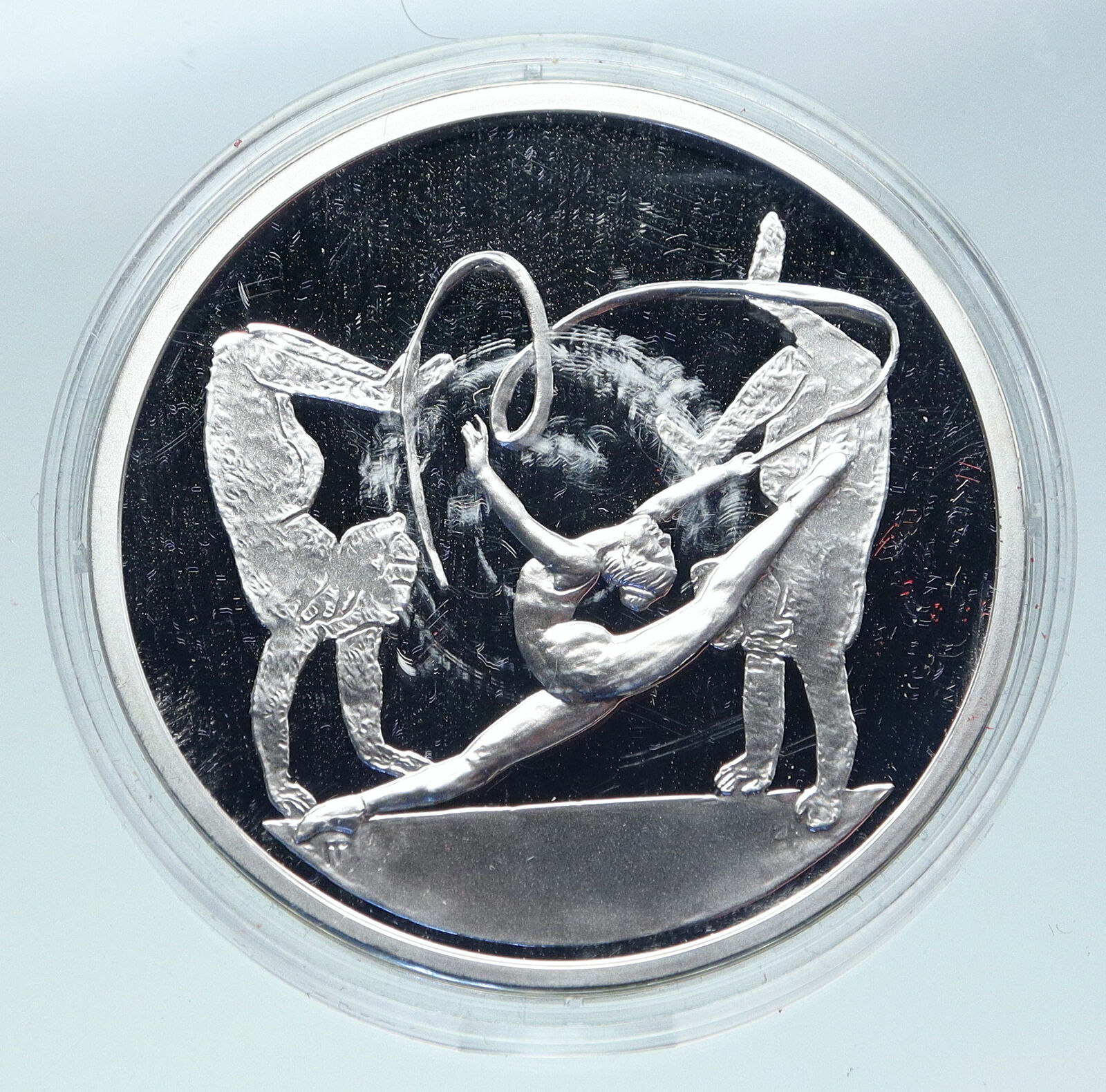|
Greece
Greek Presidency of the EU
2003 Proof Silver 10 Euro 28.25mm (9.75 grams) 0.925 Silver (0.290 oz. ASW)
Reference: KM# 208
(50,000 Mintage) | Engraver: G. Stamatopoulos
ΕΛΛΗΝΙΚΗ ΔΗΜΟΚΡΑΤΙΑ 10 ΕΥΡΩ, The Greek national emblem.
ΕΛΛΗΝΙΚΗ ΠΡΟΕΔΡΙΑ ΤΗΣ ΕΥΡΩΠΑΙΚΗΣ ΕΝΩΣΗΣ HELLENIC, PRESIDENCY OF E.U., The Greek Presidency logo (dove) and the inscription “Greek Presidency of the European Union – Hellas 2003”.
Coin Notes:
“OUR EUROPE. We share the Future in a Community of Values” is the massage of the Greek Presidency, expressing its commitment to promoting a community of values that recognizes the citizen’s right to security, democracy and a better quality of life. A community with institutions that guarantee participation and equality. A community which makes everyone feel that their voice is being heard, that they belong to this new great family, to our Europe, the Europe of all the European people, without exceptions and exclusions. The coin is issued in BU quality in triptych blister set along with eight (8) Greek euro coins (€2, €1, €0.50, €0.20, €0.10, €0.05, €0.02, €0.01), minted in 2003 also in BU quality.
You are bidding on the exact item pictured, provided with a Certificate of Authenticity and Lifetime Guarantee of Authenticity.
 The Presidency of the Council of the European Union is responsible for the functioning of the Council of the European Union, the upper house of the EU legislature. It rotates among the member states of the EU every six months. The presidency is not an individual, but rather the position is held by a national government. It is sometimes incorrectly referred to as the “president of the European Union”. The presidency’s function is to chair meetings of the Council, determine its agendas, set a work programme and facilitate dialogue both at Council meetings and with other EU institutions. The presidency is currently, as of July 2020, held by Germany. The Presidency of the Council of the European Union is responsible for the functioning of the Council of the European Union, the upper house of the EU legislature. It rotates among the member states of the EU every six months. The presidency is not an individual, but rather the position is held by a national government. It is sometimes incorrectly referred to as the “president of the European Union”. The presidency’s function is to chair meetings of the Council, determine its agendas, set a work programme and facilitate dialogue both at Council meetings and with other EU institutions. The presidency is currently, as of July 2020, held by Germany.
Three successive presidencies are known as presidency trios. The current trio (2020-2021) is made up of Germany (July-December 2020), Portugal (January-June 2021) and Slovenia (July-December 2021). The German presidency began the second cycle of presidencies, after the system was introduced in 2007.
 GreeceHellenic Republic (Greek: Ελληνική Δημοκρατία), historically also known as Hellas, is a country in Southern Europe, with a population of approximately 11 million as of 2016. Athens is the nation’s capital and largest city, followed by Thessaloniki. GreeceHellenic Republic (Greek: Ελληνική Δημοκρατία), historically also known as Hellas, is a country in Southern Europe, with a population of approximately 11 million as of 2016. Athens is the nation’s capital and largest city, followed by Thessaloniki.
Greece is located at the crossroads of Europe, Asia, and Africa. Situated on the southern tip of the Balkan peninsula, it shares land borders with Albania to the northwest, the Republic of Macedonia and Bulgaria to the north, and Turkey to the northeast. The Aegean Sea lies to the east of the mainland, the Ionian Sea to the west, the Cretan Sea and the Mediterranean Sea to the south. Greece has the longest coastline on the Mediterranean Basin and the 11th longest coastline in the world at 13,676 km (8,498 mi) in length, featuring a large number of islands, of which 227 are inhabited. Eighty percent of Greece is mountainous, with Mount Olympus being the highest peak at 2,918 metres (9,573 ft). The country consists of nine geographic regions: Macedonia, Central Greece, the Peloponnese, Thessaly, Epirus, the Aegean Islands (including the Dodecanese and Cyclades), Thrace, Crete, and the Ionian Islands.
 Greece is considered the cradle of Western civilization,,[a] being the birthplace of democracy, Western philosophy, the Olympic Games, Western literature, historiography, political science, major scientific and mathematical principles, and Western drama.[12] From the eighth century BC, the Greeks were organised into various independent city-states, known as polis, which spanned the entire Mediterranean region and the Black Sea. Philip of Macedon united most of the Greek mainland in the fourth century BC, with his son Alexander the Great rapidly conquering much of the ancient world, spreading Greek culture and science from the eastern Mediterranean to the Indus River. Greece was annexed by Rome in the second century BC, becoming an integral part of the Roman Empire and its successor, the Byzantine Empire, wherein the Greek language and culture were dominant. The Greek Orthodox Church also shaped modern Greek identity and transmitted Greek traditions to the wider Orthodox World. Falling under Ottoman dominion in the mid-15th century, the modern nation state of Greece emerged in 1830 following a war of independence. Greece’s rich historical legacy is reflected by its 18 UNESCO World Heritage Sites, among the most in Europe and the world. Greece is considered the cradle of Western civilization,,[a] being the birthplace of democracy, Western philosophy, the Olympic Games, Western literature, historiography, political science, major scientific and mathematical principles, and Western drama.[12] From the eighth century BC, the Greeks were organised into various independent city-states, known as polis, which spanned the entire Mediterranean region and the Black Sea. Philip of Macedon united most of the Greek mainland in the fourth century BC, with his son Alexander the Great rapidly conquering much of the ancient world, spreading Greek culture and science from the eastern Mediterranean to the Indus River. Greece was annexed by Rome in the second century BC, becoming an integral part of the Roman Empire and its successor, the Byzantine Empire, wherein the Greek language and culture were dominant. The Greek Orthodox Church also shaped modern Greek identity and transmitted Greek traditions to the wider Orthodox World. Falling under Ottoman dominion in the mid-15th century, the modern nation state of Greece emerged in 1830 following a war of independence. Greece’s rich historical legacy is reflected by its 18 UNESCO World Heritage Sites, among the most in Europe and the world.
Greece is a democratic and developed country with an advanced high-income economy, a high quality of life, and a very high standard of living. A founding member of the United Nations, Greece was the tenth member to join the European Communities (precursor to the European Union) and has been part of the Eurozone since 2001. It is also a member of numerous other international institutions, including the Council of Europe, the North Atlantic Treaty Organization (NATO), the Organisation for Economic Co-operation and Development (OECD), the World Trade Organization (WTO), the Organization for Security and Co-operation in Europe (OSCE), and the Organisation internationale de la Francophonie (OIF). Greece’s unique cultural heritage, large tourism industry, prominent shipping sector and geostrategic importance[b] classify it as a middle power. It is the largest economy in the Balkans, where it is an important regional investor.
|





 The Presidency of the Council of the European Union is responsible for the functioning of the Council of the European Union, the upper house of the EU legislature. It rotates among the member states of the EU every six months. The presidency is not an individual, but rather the position is held by a national government. It is sometimes incorrectly referred to as the “president of the European Union”. The presidency’s function is to chair meetings of the Council, determine its agendas, set a work programme and facilitate dialogue both at Council meetings and with other EU institutions. The presidency is currently, as of July 2020, held by Germany.
The Presidency of the Council of the European Union is responsible for the functioning of the Council of the European Union, the upper house of the EU legislature. It rotates among the member states of the EU every six months. The presidency is not an individual, but rather the position is held by a national government. It is sometimes incorrectly referred to as the “president of the European Union”. The presidency’s function is to chair meetings of the Council, determine its agendas, set a work programme and facilitate dialogue both at Council meetings and with other EU institutions. The presidency is currently, as of July 2020, held by Germany.  GreeceHellenic Republic (Greek: Ελληνική Δημοκρατία), historically also known as Hellas, is a country in Southern Europe, with a population of approximately 11 million as of 2016. Athens is the nation’s capital and largest city, followed by Thessaloniki.
GreeceHellenic Republic (Greek: Ελληνική Δημοκρατία), historically also known as Hellas, is a country in Southern Europe, with a population of approximately 11 million as of 2016. Athens is the nation’s capital and largest city, followed by Thessaloniki. Greece is considered the cradle of Western civilization,,[a] being the birthplace of democracy, Western philosophy, the Olympic Games, Western literature, historiography, political science, major scientific and mathematical principles, and Western drama.[12] From the eighth century BC, the Greeks were organised into various independent city-states, known as polis, which spanned the entire Mediterranean region and the Black Sea. Philip of Macedon united most of the Greek mainland in the fourth century BC, with his son Alexander the Great rapidly conquering much of the ancient world, spreading Greek culture and science from the eastern Mediterranean to the Indus River. Greece was annexed by Rome in the second century BC, becoming an integral part of the Roman Empire and its successor, the Byzantine Empire, wherein the Greek language and culture were dominant. The Greek Orthodox Church also shaped modern Greek identity and transmitted Greek traditions to the wider Orthodox World. Falling under Ottoman dominion in the mid-15th century, the modern nation state of Greece emerged in 1830 following a war of independence. Greece’s rich historical legacy is reflected by its 18 UNESCO World Heritage Sites, among the most in Europe and the world.
Greece is considered the cradle of Western civilization,,[a] being the birthplace of democracy, Western philosophy, the Olympic Games, Western literature, historiography, political science, major scientific and mathematical principles, and Western drama.[12] From the eighth century BC, the Greeks were organised into various independent city-states, known as polis, which spanned the entire Mediterranean region and the Black Sea. Philip of Macedon united most of the Greek mainland in the fourth century BC, with his son Alexander the Great rapidly conquering much of the ancient world, spreading Greek culture and science from the eastern Mediterranean to the Indus River. Greece was annexed by Rome in the second century BC, becoming an integral part of the Roman Empire and its successor, the Byzantine Empire, wherein the Greek language and culture were dominant. The Greek Orthodox Church also shaped modern Greek identity and transmitted Greek traditions to the wider Orthodox World. Falling under Ottoman dominion in the mid-15th century, the modern nation state of Greece emerged in 1830 following a war of independence. Greece’s rich historical legacy is reflected by its 18 UNESCO World Heritage Sites, among the most in Europe and the world.




